Rocket From The Tombs - The Day the Earth Met the Rocket From the Tombs
by Jon Rogers
published: 26 / 11 / 2011
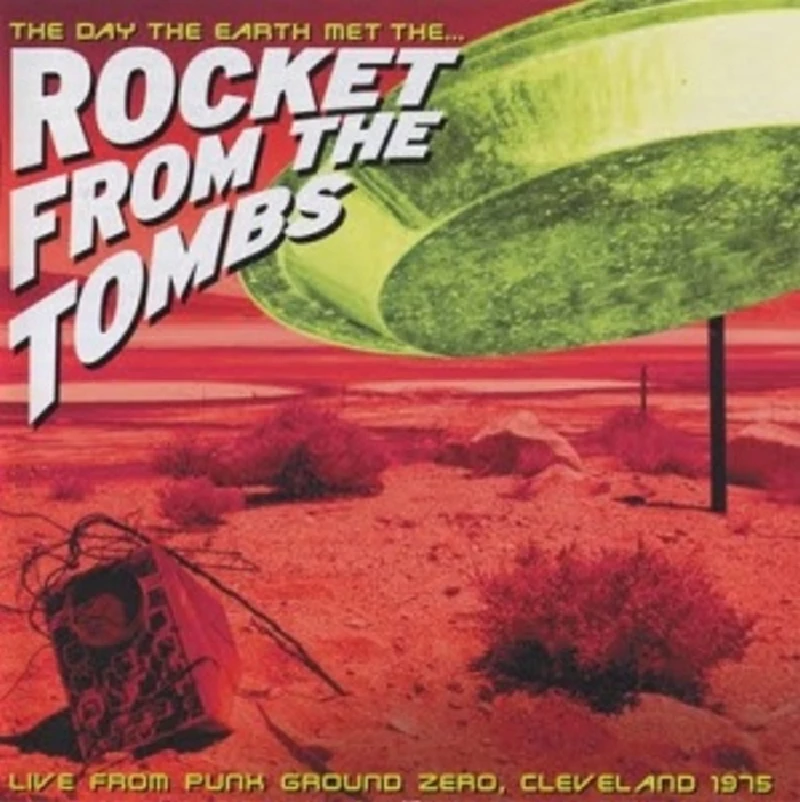
Label:
Select Label
Format: N/A
intro
In our 'Re:View' section, in which our writers look back at albums from the past, Jon Rogers reflects on the turbulent career of short-lived mid 70's punk pioneers Rocket From the Tombs, and their recently reissued posthumous 2002 album of demos and live recordings, 'The Day the Earth Met...'
Like 'The Rhyme of the Ancient Mariner', the story of Cleveland's short-lived Rocket From the Tombs is a cautionary one and far from happy - full of drug casualties, missed opportunities and generally being in the wrong place at the wrong time. Cleveland is something of a strange place, according to historian Mike Weldon, rather detached from the more metropolitan urban cities but still a working-class town with unsophisticated tastes but with a strong, if small, underground music scene with supportive local radio stations. The city had once been prosperous and been synonymous with steel production after the Second World War. but the mills had failed to keep up with times and modernise and so lost out to cheaper imports. In her article 'Those Were Different Times: a History of Cleveland 1969-79' for 'Cle' magazine in 1979, Charlotte Pressler viewed most of the people who were part of the city's underground scene as being from "middle or upper-middle class backgrounds. Most were very intelligent. There was no reason why they should not have effected an entry into the world of their parents. Yet all of them turned their backs on this world, and that meant a number of very painful choices. Yet they were not drop-outs in the sixties sense: they felt, if anything, acertain affection for consumerist society and a total contempt for the so-called counterculture. The sixties drop-outs dropped in to a whole world of people like themselves; these people were on their own." Effectively, they created their own Bohemianism and the post-industrial landscape provided the perfect backdrop for Rocket From the Tombs. Front man David Thomas tried to sum up Cleveland to the ‘NME’ some years later: "A giant, blown-out factory town. There's the Flats with all this incredible industry, steel mills going flat out all day and all night, and it's just half a mile away from where all the people live. This gives them the feeling that there's no future for somebody here, and all the musicians seem to be in love with that fact. In Cleveland nobody's going to pay any attention to you. The bands all know there's no future in a commercial sense for them, so they all say we're going to do what we goddamn want." And yet for a band that barely lasted more than a year and never released anything in their lifetime they've had a profound influence on punk - particularly in the USA and yet still remain, largely, unknown to a wider audience that rate the likes of the Stooges and the MC5. Songs like the grim, nihilistic 'Ain't it Fun' or the ferocity of '30 Seconds Over Tokyo' or 'So Cold' really deserve to be held in the same sort of acclaim as 'Kick Out the Jams' or 'Search and Destroy'. And many listeners may very well know of, and heard, the band's most famous songs such ‘30 Seconds Over Tokyo', 'Sonic Reducer' and 'Final Solution', but just not as songs by Rocket From the Tombs. David Thomas had created the nom de plume Crocus Behemoth as an alias for his writing for Cleveland's 'The Scene' magazine but this creation took on a life of its own and became something of an alter ego and he teamed up with his 'The Scene' colleague Kim Zonneville to form what would become the Rocket From the Tombs. The name came from a Frank Zappa-inspired short film Thomas had made at high school with Jon Luoma which was called 'The Day the Earth Met the Rocket From the Tombs'. Along with Zappa - whose 'Uncle Meat' album - with its tape-splicing studio collages were a particular favourite - Thomas also listened to a diet of Captain Beefheart, the Stooges and the Velvet Underground. Another favourite was Lenny Kaye's compilation 'Nuggets' of US sixties underground bands. Effectively anti-hippie, pro-primitivism. Years later Thomas would cite the first three albums he ever bought were Zappa's 'Uncle Meat' and 'Hot Rats' as well as Beefheart's 'Trout Mask Replica'. The band's line-up for their first gig on 16 June 1974 at the Viking Saloon was Thomas' alter ego on bass and vocals, Zonneville, also on bass and vocals with Glenn 'Thunderhand' Hach on guitar and on drums was Tom Clements (aka Tom Foolery). Tellingly, they dubbed themselves with the satirical moniker The World's Only Dumb-Metal Mind-Death Rock & Roll Band' and played a sort of 'spoof-rock', primarily playing Fifties and Sixties songs, rewritten as skits as a parody of contemporary rock and roll. As Clinton Heylin notes in 'From the Velvets to the Voidoids', songs such as 'Hey Joe' became rewritten as 'Hey Punk' with its opening line as: "Hey punk, where you goin' with that glitter in your hair?" Rocket From the Tombs though only really came into their own once guitarist Peter Laughner joined, which gave the band a clear focus and transformed the group out of their sub-Zappa style parodies of rock 'n' roll and into something unique with something more serious to say. Laughner, according to his ex-wife Charlotte Pressler, was something of an "underground jukebox" with a wide knowledge of music, but was sparked into action by the string of gigs the Velvet Underground played at La Cave club in Cleveland in 1968 and 1969 and was a vocal advocate of what he called 'Total Velvetisation', which meant being immersed in the work of New York's leading lights of the underground movement. While Laughner had an extensive musical knowledge. he was still wracked with insecurities and a lack of trust in his own abilities. In Thomas, Laughner saw someone who had the same eclectic tastes has himself but also someone that could help him overcome his own doubts. Laughner also had a troubled, dark side to his personality, as noted by Pressler, whom she described as "very dark". And according to her, if he liked anyone else it was because they also had that "streak of darkness in them". Although Thomas and Laughner quickly became firm friends there was also a fundamental difference between the two. According to Pressler, while Thomas loved Zappa for his cleverness and wit, Zappa left Laughner cold, whom he saw as not having enough "heart". Zappa was in Laughner's mind too detached and he couldn't connect with it emotionally. The remaining members of the group were ditched and Gene O'Connor (aka Cheetah Chrome) was brought in on guitar, Craig Bell on bass and Johnny 'Madman' Madansky (later Johnny Blitz) on drums. O'Connor and Madansky had a love of glam rock and the likes of the New York Dolls and Alice Cooper and had played, separately, in two-bit bands like Slash and Sarah Blue. Bell tells a telling anecdote about his unwitting introduction to 'Cheetah Chrome' before he joined the band. Working as a taxi driver in the city he took a call to go "one of the worst tenements on the West Side one evening". As he pulled up out walked one of the weirdest people he'd ever seen: "He was dressed from head to toe in a silver suit and silver boots, with long, bright red hair, and chrome aviator sunglasses (although it was about 9 O'clock at night). He hopped in the back seat, and told me to take him to Twiggy's, a trendy East Side bar. Once we arrived, he fumbled around in his pockets to pay the fare and came up 10 cents short. I told him not to worry about it and we both went on our separate ways. Some months later, when I was asked to audition for Rocket, it was my first introduction to O'Connor (aka Cheetah Chrome). We all ended up at a coffee shop afterwards. Something had been bugging me all the time we'd been playing together. Finally, over a cup of coffee, and some get-to-know-you conversation, I looked Cheetah dead in the eye and said 'Hey, you son of a bitch, you owe me 10 cents!’" The initial Rocket From the Tombs had started out as something of a joke band but with Laughner joining they took on a much more serious persona. According to Pressler, it was Laughner who convinced Thomas to take himself seriously as a singer and musician. In an interview with the 'Cleveland Plain Dealer' in October 1974 Laughner set out his 'serious' vision of the band, saying, "Rock and roll used to be able to get you to do things. It used to get you to think about what you were doing, but now all it does is sort of lull you into a state of complacency, the major concern being strictly to have a good time. Entertainment is fine, but there has to be something beyond that. It may sound pretentious to talk about making art statements but it is possible to make an art statement with music." Early songs written included 'Down in Flames', 'Transfusion'. '30 Seconds Over Tokyo', 'Never Gonna Kill Myself Again' and 'Ain't It Fun' which O'Connor already had the music for and were wed to the half-finished lyrics by Thomas and Laughner. Another early song was 'So Cold', which had an Alice Cooper feel, which was done deliberately to help the new recruits fit in. The band's sets would also feature various covers of Detroit bands like the MC5 and The Stooges. In rehearsals while Laughner was quickly picking up the title of band leader all five members pitched in ideas. As O'Connor would state, "We got along well back then. It felt like a real team." The Viking Saloon saw the live debut of the new-look band during a 'Special Extermination' night on 22 December 1974 which saw The Electric Eels top the bill with the Mirrors taking the opening slot. Instead of covers of 'Kick Out the Jams', Rocket From the Tombs waded through the psycho-drama '30 Seconds Over Tokyo' (a retelling of the Doolittle raid on Japan during World War II), 'Down in Flames', ' What Love Is' and 'Life Stinks'. '30 Seconds Over Tokyo' is a seminal song and cited by 'The Wire' in September 1998 as one of the key 100 records that changed the musical landscape. The song - which can vary in length anywhere between about six and nine minutes - tells a horrifying tale of the US bombing raids on Japan during World War II as a pilot goes on a "one-way ride" to the Japanese capital with the flight going down in a ball of flames. The twin guitars of Laughner - playing the clear, angular refrain - and O'Connor embarking on the frenzied sonic assault - conjures up fear, trembling and dread. While the plane goes on its journey, the listener is also taken inside the mind of those embarking on the raid as they not only acknowledge the terror they are inflicting, but also the horror that it all could easily happen again. Not to mention the terror that they themselves face as they fly in their "metal dragon" on their "suicide ride". Although, according to Thomas, the gig was poorly attended and the place wasn't full the gig is now seen as something of a landmark with the three key underground Cleveland bands playing on the same bill for the first (and last) time, essentially defining the start of a scene in the city. Luckily, a friend of Laughner's was the local DJ Kid Leo and had agreed to front a series of Sunday night shows on WMMS featuring local bands, one of the band's featured was Rocket From the Tombs. This created the chance for the band to make their own recordings. So on 18 February 1875 the band went into their rehearsal loft on West 4th St with a reel-to-reel tape Laughner had borrowed and a reverb unit and ended up recording 11 songs. "It was a large space," remembers Bell. "Maybe 20 x 50, which suited our purposes considering the volume we played at. I recall we put Cheetah's Orange amps all the way at the back of the room with a mic facing them so the rest of us could hear what we were doing. I was in charge of the Sun 6-channel mixer along with turning on and off the 2-track tape machine to which it fed. Considering the primitive acoustics and limitations of our situation, I think we got quite a great tape out of it." The tape was aired the following Sunday, with an accompanying commentary by Laughner. Nne songs made it onto the currently released 'The Day the Earth Met...' Recorded at the time were covers of the Rolling Stones' 'Satisfaction' and the Stooges' 'Search and Destroy' along with nine originals which included 'Down in Flames', 'What Love Is', 'Ain't it Fun' and 'Never Gonna Kill Myself Again' as well as '30 Seconds Over Tokyo' and 'Life Stinks'. Also recorded were 'Transfusion' and 'So Cold', which Thomas later described as "a hymn to numbness... a cross between 'Night of the Living Dead' and the Utopia Lounge." With the radio broadcast and the band's steady stream of playing clubs, which included The Agora where Rocket had opened for a reformed Iron Butterfly gig, the band were now playing to their largest audiences and the songs just kept coming, including two which would later be seen as proto-punk classics - 'Final Solution' and 'Sonic Reducer'. As Thomas has always maintained, 'Final Solution' was inspired by the Sherlock Holmes mystery 'The Final Problem' rather than any dodgy Nazi overtones: "I had the flu and I was reading Sherlock Holmes between bouts of fevered hallucination. All I could think of for what seemed like days was that if there's a final problem there's got to be a final solution." Musically 'Final Solution' takes its cue from Blue Cheer's version of the rock 'n' roll standard 'Summertime Blues' but all stripped down - or reduced as Thomas would call it, a sonic reduction - to its minimal components. "I went to Bell and described what I wanted musically," Thomas remembers. "Summertime Blues reduced to the minimal - a throb and then a big burst of noise and then back to a throb." Whilst waiting for the other band members to arrive for a rehearsal Thomas and Bell started working on the song and had the bare bones of the songs by the time everyone else had arrived and Laughner added on an outro. 'Final Solution' mentions Thomas' theory about a "sonic reduction", a stance that would find its form in 'Sonic Reducer', another song penned by Thomas. Gigs, by all accounts, were invariably out of the ordinary. "The shows were usually pretty intense," reflects O'Connor. "Crocus [Thomas] could work himself into a pretty good frenzy back then, occasionally doing the 'gator', rolling around on the floor, wearing that judges robe, or graduation robe or whatever the hell it was. Peter used to say some pretty off the wall stuff, leaving the audience shaking their heads. Craig used to say we needed to buy him a leather gag!" Thomas, at the time would wear a long choir robe on stage and he would invariably be drenched in sweat although Bell also remembers Thomas coming out wearing a dog collar on a chain as well. Pressler recollects a gig at the Berea Community Center which was attended by Thomas' parents: "He did the dance where you wallow along on your belly over the floor, and he had a box of dog biscuits and he was doing 'I Wanna Be Your Dog' and he started throwing the dog biscuits but he was rather excited, it wasn't happening fast enough, so he threw the whole box and it hit his father on the head." The zenith of the band though was soon to pass as Madansky left the group after the gig at the Berea Community Center and Laughner introduced Stiv Bators to the band. According to O'Connor the writing was on the wall from then on: "Pete always said that once I met Stiv, he knew Rockets days were numbered." Ultimately a friend of Bell's, Wayne Strick, would fill the drum stool but before that could happen WMMS and The Agora had set up a 'Heavy Metal Showcase' for 5th May and the band needed someone urgently, so record store clerk Don Evans was brought in temporarily. Five songs in the band's set were professionally recorded with two - 'Down in Flames' and the Stooges cover 'Search and Destroy' actually aired the following Sunday. For outsiders the band appeared to be on the up with a plentiful supply of local gigs, support from the likes of 'Creem' editor Lester Bangs and radio exposure, but for Thomas things were starting to get to him. "I was getting insecure about my singing," reflects Thomas. "I had to sing in ways I wasn't into - melody was not my thing - and I was still relatively new to the stage. There may have been something going on behind the scenes as well. In any case I wanted to sing less so I picked up an Ace Tone organ and Peter had a sax I started playing." With Thomas taking one step back out of the glare of the spotlight, a position opened up for Bators to step into. O'Connor was only too aware of Thomas' vocal limitations but wasn't too enamoured of Bators' vocal style either. "I always thought Crocus sang pretty good, I mean, he wasn't exactly a crooner, but it worked on a lot of our stuff. When we tried to do more melodic stuff, it kind of became a big point. To be honest, I wasn't crazy about Stiv's voice back then. He didn't have enough balls which used to drive me nuts. Crocus definitely had balls." With Bators joining the band, Thomas was effectively sidelined, but, as Laughner wrote to a friend in New York, Thomas was still very much part of the band: "Crocus is blowing alto sax, sounding freakishly like Steve MacKay on 'Funhouse' or Albert Ayler without the vibrato. He being the conceptualist and lyricist along with me we couldn't very well set him adrift, despite his limited stage trip." There were a few divisions in the band too. Laughner wanted to release a cover of Garland Jeffreys’ 'Wild in the Streets' as a single, but O'Connor really didn't like the idea. "We tried it a few times, with Stiv singing, but I personally hated it and it never really came together. I would have preferred one of the Roxy Music songs that we did - 'Remake Remodel', 'Sea Breezes' - but on the B-side." And there was the issue of simply releasing a cover for a new band to release as their debut. What sort of statement would that make? In April Laughner had been to see Television's residency at New York's famed CBGB's with Patti Smith in support and been suitably impressed, suggesting to Verlaine and the band that they play Cleveland for their first gigs outside of their home city and pressed the downtown club Piccadilly to put up the cash for two gigs on 24 and 25 July with Rocket From the Tombs in support. But in what was meant to be a highlight for the young band the support slot verged on disaster. In the dressing room O'Connor and Bell embarked on a scuffle whilst two other members dropped acid before going on. But during the opener, 'Sonic Reducer' O'Connor fell backwards and continued to play on his back. Rifts within the band became open wounds and after they had come off stage O'Connor remembers "lots of nasty things got said. Everything came to a head that night." O'Connor and Strick, according to O'Connor were "still in our teen angst stoner phase", who viewed Laughner and Thomas, both at the grand old age of 22, as "the adults". According to Pressler the band was suffering from multiple schisms and was "starting to dissolve into eclecticism". "[It] had lost a sense of what it did well. Peter's old rock and roll standards were competing with Craig's Roxy/Velvets stuff which was competing with the Detroit stuff, which at least had fit in with the original sound of the band. Nobody was sure why they were doing this anymore, or what they were doing." The end though came in August though when the band played a double bill at the Viking Saloon in August. During the set O'Connor brought Bators up on the stage to sing, prompting Thomas to immediately walk off. Then during 'Down in Flames/Search and Destroy' with O'Connor and Bators thrashing about on the floor, Laughner walked off. Bell carried on for a short while until he also gave up the ghost and walked off. Instead of grabbing the opportunity, Rocket From the Tombs had broken apart, split between the art-rockers and the fuck-art rockers. As Thomas states in Clinton Heylin's 'Babylon's Burning: from punk to grunge': "It was a brave attempt, a brave experiment to fuse two incompatible forms. To have that fragile and explosive a thing made it exciting, but it also made it doomed." And that was the end of Rocket From the Tombs. As O'Connor remembers, "I don't remember if anybody from Rocket From the Tombs talked after that, it was weird. Looking back, with a little perspective, it really was an honour to play in that band. We didn't realise at the time that we were one of the first punk bands. We just played what we felt." Thomas sums up the problems with the band succinctly in 'From the Velvets to the Voidoids': "The band broke up because it was untenable... just everything was a bit too schizoid. There was the Gene O'Connor, Johnny Madansky, Dead Boys thing - [Let's rock out] at all costs! Stiv Bators, Johnny Madansky, Gene O'Connor on one side. Me, Peter and Craig on the other. It just wasn't going to hold together very long. It was a brave attempt, a brave experiment to fuse two incompatible forms... I just remember sitting there [at the Piccadilly] thinking 'why am I doing this?" After that, Thomas and Laughner went on to form Pere Ubu while O'Connor Bators and Madansky formed the Dead Boys. The rest, as the saying goes, is history. Laughner became a casualty of excessive drug and alcohol abuse, dying at the early age of 24. Rocket From the Tombs though, largely fell into obscurity apart from the odd bootleg like 'Life Stinks' in 1990 which scratched around the slim pickings of the band's recorded output although the band made it to wider acclaim in 2002 with the initial release of 'The Day the Earth Met...' which isn't really a 'proper' album from the band, more a rag-tag collection of the band's recordings - some from the rehearsal loft recordings and a selection of live recordings from the Piccadilly and Agora. Despite that it still gives a flavour of the band with what nowadays are seen as punk classics: 'Ain't it Fun', 'Life Stinks' and 'Amphetamine' as well as covers of the Stooges', 'Raw Power' the Velvet's 'Foggy Notion' and the Stones' 'Satisfaction'. And now Fire Records have dusted off the cobwebs and re-released it, the long-forgotten band are well worth investigating.
Track Listing:-
Band Links:-
https://www.facebook.com/rocketfromthetombshttp://www.ubuprojex.com/rftt.html
http://rocketfromthetombsmusic.bandcamp.com/
Picture Gallery:-
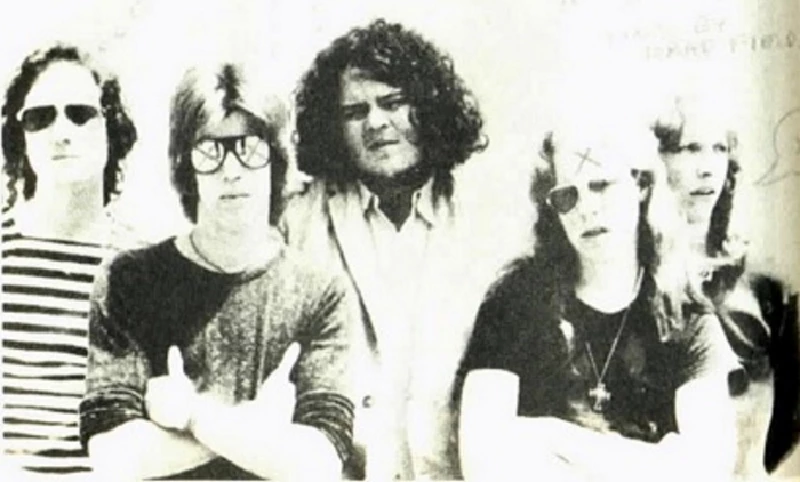
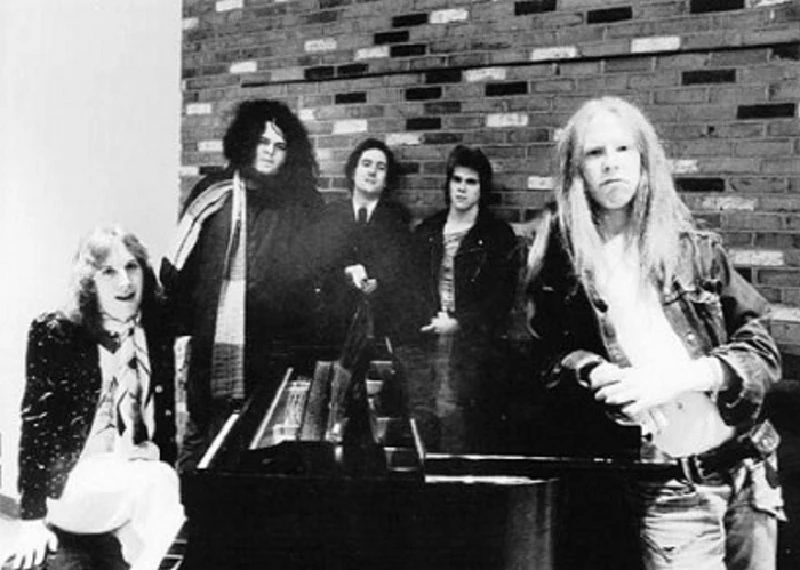
live reviews |
|
London Fields Brewery, London, 12/12/2015 |
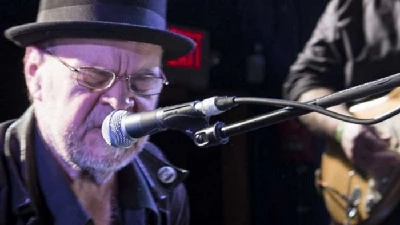
|
| Adrian Janes watches 1970s proto-punk pioneers Rocket From The Tombs play a storming, sweaty set in London. |
reviews |
|
The Black Album (2016) |
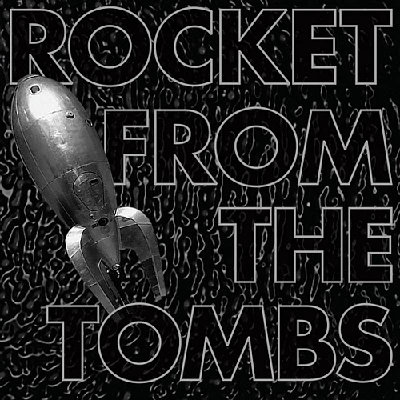
|
| Reinvigorated with new members, pioneering and reformed 70’s band Rocket from the Tombs' resurrection continues on their third album with their original energy and attitude still very much present |
| Rocket Redux (2004) |
most viewed articles
current edition
John McKay - InterviewCathode Ray - Interview
Robert Forster - Interview
When Rivers Meet - Waterfront, Norwich, 29/5/2025
Spear Of Destiny - Interview
Fiona Hutchings - Interview
Carl Ewens - David Bowie 1964 to 1982 On Track: Every Album, Every Song
Chris Wade - Interview
Shrag - Huw Stephens Session 08.12.10 and Marc Riley Session 21.03.12
Brian Wilson - Ten Songs That Made Me Love...
previous editions
Heavenly - P.U.N.K. Girl EPBoomtown Rats - Ten Songs That Made Me Love....
Manic Street Preachers - (Gig of a Lifetime) Millennium Stadium, Cardiff, December 1999
Allan Clarke - Interview
Oasis - Oasis, Earl's Court, London, 1995
Barrie Barlow - Interview
Beautiful South - Ten Songs That Made Me Love...
Pixies - Ten Songs That Made Me Love...
Chuck Prophet - Ten Songs That Made Me Love...
Dwina Gibb - Interview
most viewed reviews
current edition
Peter Doolan - I Am a Tree Rooted to the Spot and a Snake Moves Around Me,in a CircleVinny Peculiar - Things Too Long Left Unsaid
Garbage - Let All That We Imagine Be The Light
Vultures - Liz Kershaw Session 16.06.88
John McKay - Sixes and #Sevens
Little Simz - Lotus
HAIM - I Quit
Pulp - More
Lapsley - I'm a Hurricane, I'm a Woman In Love
Billy Nomates - Metalhorse
related articles |
|
Cheetah Chrome: Interview (2014 |
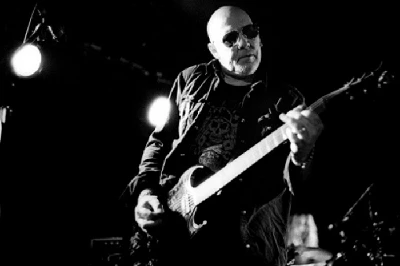
|
| John Clarkson speaks to punk guitarist Cheetah Chrome about his bands Rocket from the Tombs and the Dead Boys, and 'Solo', his new mini-album and debut solo release |
Pennyblackmusic Regular Contributors
Adrian Janes
Amanda J. Window
Andrew Twambley
Anthony Dhanendran
Benjamin Howarth
Cila Warncke
Daniel Cressey
Darren Aston
Dastardly
Dave Goodwin
Denzil Watson
Dominic B. Simpson
Eoghan Lyng
Fiona Hutchings
Harry Sherriff
Helen Tipping
Jamie Rowland
John Clarkson
Julie Cruickshank
Kimberly Bright
Lisa Torem
Maarten Schiethart